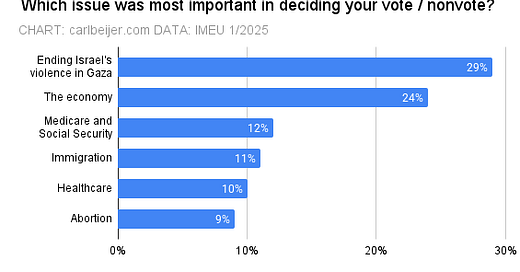The Gaza ceasefire vindicates protest voters
Yesterday's announcement undercuts a major argument against protest voting.
A remarkable sequence of news announcements and reactions unfolded yesterday with unmistakable implications for the discourse around protest voting.
First, early in the afternoon, a new poll revealed that the Israel-US war on Gaza was the leading issue for Biden 2020 voters who did not support Kamala Harris:
The poll, which was first reported on by Ryan G…
Keep reading with a 7-day free trial
Subscribe to Carl Beijer to keep reading this post and get 7 days of free access to the full post archives.





